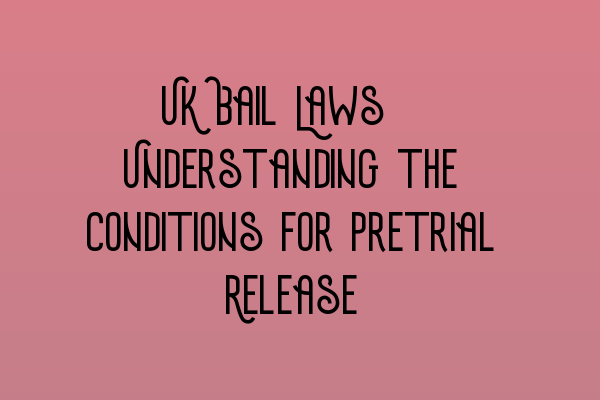UK Bail Laws: Understanding the Conditions for Pretrial Release
Being charged with a criminal offense can be a stressful and overwhelming experience. One important aspect of the UK criminal justice system is the concept of bail, which allows individuals accused of a crime to be released from custody while they await their trial. However, the granting of bail is subject to certain conditions that must be met to ensure the individual’s compliance with the legal process.
What is Bail?
Bail refers to the temporary release of an accused person from custody, pending their trial. It serves two primary purposes:
- Allows the individual to continue their normal life and responsibilities, such as work or caring for dependents, while awaiting trial.
- Ensures the accused person’s appearance in court and reduces the possibility of them becoming a flight risk.
Conditions for Pretrial Release
When granting bail, the court imposes conditions on the accused person to ensure public safety and prevent obstruction of justice. These conditions can vary depending on the specific case and the severity of the alleged offense. Some common conditions include:
- Residence requirement: The accused person may be required to live at a specified address and report regularly to a local police station.
- Curfew: A curfew may be imposed, restricting the accused person’s movements during specific hours.
- Surrender of travel documents: Passports and other travel documents may be confiscated to prevent the accused person from leaving the country.
- Non-contact orders: The court may prohibit the accused person from contacting certain individuals, especially victims or potential witnesses.
- Drug and alcohol testing: In cases involving substance abuse, regular testing may be required to ensure sobriety.
- Bail surety: A surety, usually a friend or family member, may be required to guarantee the accused person’s compliance with bail conditions and ensure their appearance in court.
It’s important to note that breaching these conditions can result in bail being revoked and the accused person being remanded in custody until their trial.
Understanding the Bail Application Process
To obtain bail, the accused person’s solicitor must make a bail application to the court. The application will include details about the defendant’s personal circumstances, ties to the community, previous criminal record (if any), and the nature of the alleged offense.
The court will consider various factors when determining whether to grant bail, including:
- The seriousness of the alleged offense
- The likelihood of the accused person absconding
- The defendant’s previous criminal history
- The strength of the evidence against the accused
- The availability of suitable bail conditions
It is crucial to have competent legal representation that specializes in criminal law to maximize the chances of a successful bail application. Qualified solicitors from our SQE Criminal Law & Practice team have extensive experience in this field and can provide you with the guidance and support you need.
For more in-depth knowledge of the UK legal system, check out our related articles:
- SQE 1 Practice Exam Questions
- SQE 1 Practice Mocks FLK1 FLK2
- SQE 2 Preparation Courses
- SQE 1 Preparation Courses
- SRA SQE Exam Dates
At SQE Criminal Law & Practice Law UK, we are committed to providing the best legal advice and services to our clients. Contact us today to discuss your case and understand how our team can assist you.
